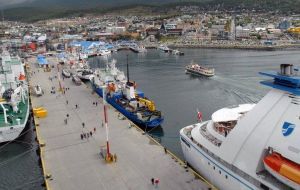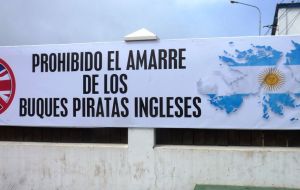MercoPress. South Atlantic News Agency
Argentina’s noose on Falklands: Buenos Aires province bans UK flagged vessels
 “Adonia” and “Star Princess” were banned from Ushuaia earlier this year invoking the “Gaucho Rivero” bill
“Adonia” and “Star Princess” were banned from Ushuaia earlier this year invoking the “Gaucho Rivero” bill In what is seen as another step of Argentina’s noose-tightening of the Falkland Islands’ economy and development, the Buenos Aires Province Senate passed a law on Thursday banning British flagged vessels from calling at Argentina’s largest province ports.
Under the latest legislation the docking, supplying of or logistical operations of vessels that fly the British flag is banned and extensive to the fluvial and maritime coastlines of the province.
The law labelled ‘Gaucho Rivero’ was put forward by President Cristina Fernandez Victory Front provincial lawmaker Patricia Cubría and will be applied to oil tankers, drilling vessels and ships that exploit natural resources within the maritime area that form part of Malvinas Islands’ territory.
“This law is a tool in place to continue advancing step-by-step in the fight for sovereignty of natural resources in the Malvinas Islands” Cubría said on Thursday.
The bill had been passed by the provincial Lower House last June 14 and is supposedly named after Antonio Rivero, “a gaucho from Entre Ríos who headed the uprising in the Malvinas against the British occupation back in 1833”
“Not only did Rivero fight for our sovereignty and to have our flag flying in the Malvinas Islands, but also led the struggle against the exploitation suffered by the gauchos in the Islands which dared to fly our flag”, said Cubría during the Senate deliberations.
In May 2011 two vessels were found docking in the port of La Plata, (capital of the Buenos Aires province) that supposedly were heading for the Malvinas Islands basin which triggered a massive protest organized by unions, political groups and Malvinas war veterans that ended with serious incidents.
It was later revealed that La Plata and other neighbourhood Councillors said they were “English vessels heading for Malvinas as part of the program to search for oil” and this provoked the immediate reaction.
A few hours later the Argentine Foreign ministry and YPF announced they were actually Norwegian vessels on logistic support contracted by then Repsol’s branch in Argentina.
That was not the first incident of this kind. Last February P&O cruise “Adonia” and Princes Cruises’ “Star Princess” were prevented from docking at Ushuaia, Tierra del Fuego, allegedly because they had previously called in the Falkland Islands.
The media in Ushuaia at the time said that the decision followed the enforcement of the so called “Gaucho Rivero” provincial bill which impedes the docking of British flagged vessels.
However the decision was seriously questioned by the president of the Ushuaia Tourism Chamber, Marcelo Lietti who called for prudence and said “the cruise industry has nothing to do with the Malvinas dispute”.
“It’s an issue that must be addressed with utmost care”, said Lietti. “We all want the Malvinas Islands back under Argentine flag but the cruise industry has nothing to do with the Malvinas dispute” and recalled that the cruise industry is one of the main sources of income for the local economy of Ushuaia.
Lietti said the bill refers to vessels involved in tasks related to the exploitation of natural resources, and “we consider cruise vessels have nothing to do with that issue”.
In August 2011 the Tierra del Fuego, Antarctica and South Atlantic Islands Province legislature, after long debate approved the “Gaucho Rivero” bill banning all permanence, docking, supplying or logistic support to all vessels flying the British flag, or convenience flag, which are linked to exploration, drilling or natural resources exploitation in the Malvinas Islands basin, on the Argentine continental platform.
The first of the two-article bill “rejects any colonization or claim actions over the sovereignty of the Malvinas Islands, islands which belong to the province of Tierra del Fuego, Antarctica and South Atlantic Islands”.
Gaucho Rivero has been turned into a legend and Malvinas history hero by the official President Cristina Fernandez administration liturgy, although there are other versions as to his true personality including claims he was a murderer and a common rustler.
In 1982 when the Argentine military invasion of the Falklands one of the fist names to be changed was the capital Port Stanley for “Puerto Rivero”. However when more information surfaced about “Gaucho Rivero” outlaw reputation, the military garrison changed the name to Puerto Argentino.





Top Comments
Disclaimer & comment rules-

-

-

Read all commentsIs this a new step up the chain, has Argentina now thrown down the gauntlet,
Aug 02nd, 2012 - 11:12 pm +1Am I reading it correctly] [lol]
Argentina is now banning all British ships, that fly the British flag, [red ensign]
If this is true, ][you tell me]
Then surely this now goes beyond the Falklands, and now includes all British cargo,
Thus, the only response the British can now do, [legally]
Is up the anti, and ban all argentine flagged vessels, from British and oversees ports,
Thus we would now have a trade war, with Argentina,
Do I have this right,
???????
.
“...will be applied to oil tankers, drilling vessels and ships that exploit natural resources within the maritime area that form part of Malvinas Islands’ territory.”
Aug 02nd, 2012 - 11:27 pm +1I seriously doubt that any ship involved in the Falklands oil campaign was planning on docking at any Argie cesspits anyway. Yet another pointless, sulky, bawling, “We want attention! Wahhh!” childlike policy decision tee hee.
@22 Argieweenie
Aug 03rd, 2012 - 07:18 am +1To be honest nobody here in the UK made any noise about GBR beating Argentina. In fact it was on one of the BBC sub channels, it had that little coverage. Contrary to your belief of how GB portray Argentina, we hardly ever mention you in the news. I'd hazard a guess that the reason some people on this forum rub the Olympics in your face is because you would do the same, especially in foozball.
Also we finished 4th in the medal rankings in Beijing, just pipped by mother Russia!
Because your nation decides that the Olympics is insignificant does not give you the right the cast judgement on its worth and also devalue its prestige. it's a magnificent festival of the worlds top athletes competing against one another, enjoy it!
In my opinion listening to you does come across as sour grapes.
Commenting for this story is now closed.
If you have a Facebook account, become a fan and comment on our Facebook Page!